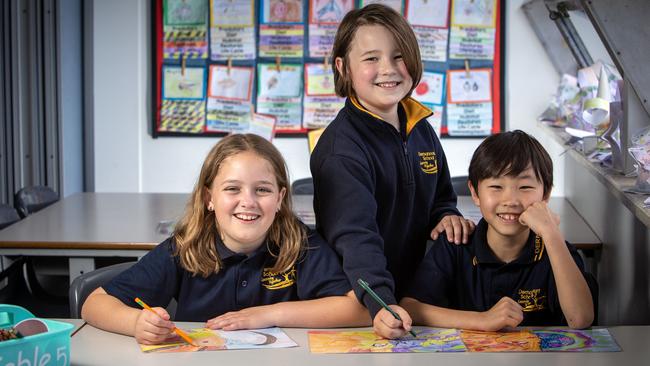SA fails to hit national average in any of 2022’s NAPLAN tests
Analysis has revealed the dire state of SA’s NAPLAN results, with the state not managing to hit the national average in even one of the controversial annual tests.
Education
Don't miss out on the headlines from Education. Followed categories will be added to My News.
South Australian schools have failed to achieve national average marks in any of the annual NAPLAN tests, raising serious questions about the state’s education system.
Official data shows SA schools remain sitting just above Tasmania and Queensland, with NSW, Victoria and WA consistently achieving higher results since the tests began in 2008. Numeracy particularly had continued to decline, prompting Education Minister Blair Boyer to direct the Education Department to investigate the introduction of a basic numeracy check.
It would be similar to phonics check brought in for year 1 students in 2018, which had been credited with improving reading and spelling by younger primary school pupils.

Analysis of the 2022 NAPLAN results by The Advertiser has revealed:
NO year level achieved scores for reading, writing, spelling, numeracy or grammar and punctuation that met or surpassed the national average;
WRITING by year 9 boys who sat NAPLAN in 2016 as year 3 students plunged from 95 per cent who met the basic national minimum to 75 per cent this year;
YEAR 3 students had their best results in reading, writing and spelling while year 5 students had their best in reading and writing;
ONLY 49 per cent of Indigenous year 9 students met the basic national minimum in writing, compared with 75 per cent for numeracy;
GIRLS continued to outperform boys across all year levels in the five tests, which were conducted online for the first time.
Mr Boyer said his biggest concern was the continued decline with numeracy.
“It’s pleasing to see our literacy scores continue to increase as a state,” he said.
“However, the results do show that numeracy results are falling. There is a clear need to act to address this issue. As such, the Malinauskas Labor Government will introduce a new mathematics improvement strategy with an increased emphasis on numeracy and mathematics in the foundation years.”
Mr Boyer said the new numeracy check would be considered as part of the strategy to help support students.
“There is no national numeracy and number check – similar to the literacy check – and so work has begun on developing one for South Australia,” he said.
“Over the next few months, the department will work with teachers and other stakeholders to develop this new strategy.”
Mr Boyer said there also would be an inaugural numeracy summit next March to provide school leaders and educators with “access to leading-edge numeracy and mathematics research to improve practice in schools”.
Opposition education spokesman John Gardner said he supported the introduction of a numeracy check, saying the NAPLAN results confirmed the phonics check was helping young children to learn to read and spell.
Mr Gardner said many teachers believed phonics instructions were especially important for boys.
“Year 3 boys are the best placed of any cohort of South Australian year 3s to succeed in the rest of their schooling,’ he said.
“This year’s year 3 students are the first cohort to have had the benefit of the early years literacy reforms now embedded in the Education Department for the entirety of their schooling Those reforms are now clearly paying dividends, and should set these students up for stronger outcomes throughout their schooling.”
Mr Gardner said the NAPLAN literacy results for year 5 students also were encouraging.
“They were on the cutting edge of those reforms, being the first cohort to do the year 1 phonics check in 2018, and so they also have had some of the benefit too,” he said.
Emotive issue but vital for our kids
Analysis - Colin James
It seems everyone loves to hate NAPLAN. Teachers have grown to resent the annual testing because they believe results are weaponised against their schools.
They object to how they are published on a federal government website, My School, where they are used by parents to compare performance. They generally don’t like NAPLAN because they feel it puts unnecessary pressure on children.
Which is a pity because NAPLAN results shed light on whether schools are delivering what all teachers and parents want – quality education.
The first of two reports from this year’s tests has provided invaluable information comparing SA’s overall performance in five key areas – numeracy, reading, spelling, writing, grammar and punctuation – against the other states. What the report has revealed, yet again, is that considerable work remains to be done, especially with numeracy.
The government’s planned move to introduce a basic numeracy check in year 1, similar to the phonics check brought in four years ago, has considerable merit.
The 2022 literacy results for years 3 and 5 provide encouraging signs that teaching phonics, a controversial and divisive pedagogical issue, is bearing fruit. This is supported by statistics that found the literacy results for year 9 students, who missed the phonics lessons, are steadily deteriorating.
This was particularly apparent within a cohort of year 9 boys, who sat the NAPLAN writing test six years ago when they were in year 3. Only 75 met the minimum national standard for writing. Another sobering statistic was how many year 9 Indigenous students met the same standard. It was 49 per cent.
It is information like this that NAPLAN was designed to obtain and for the education system to take action over.



